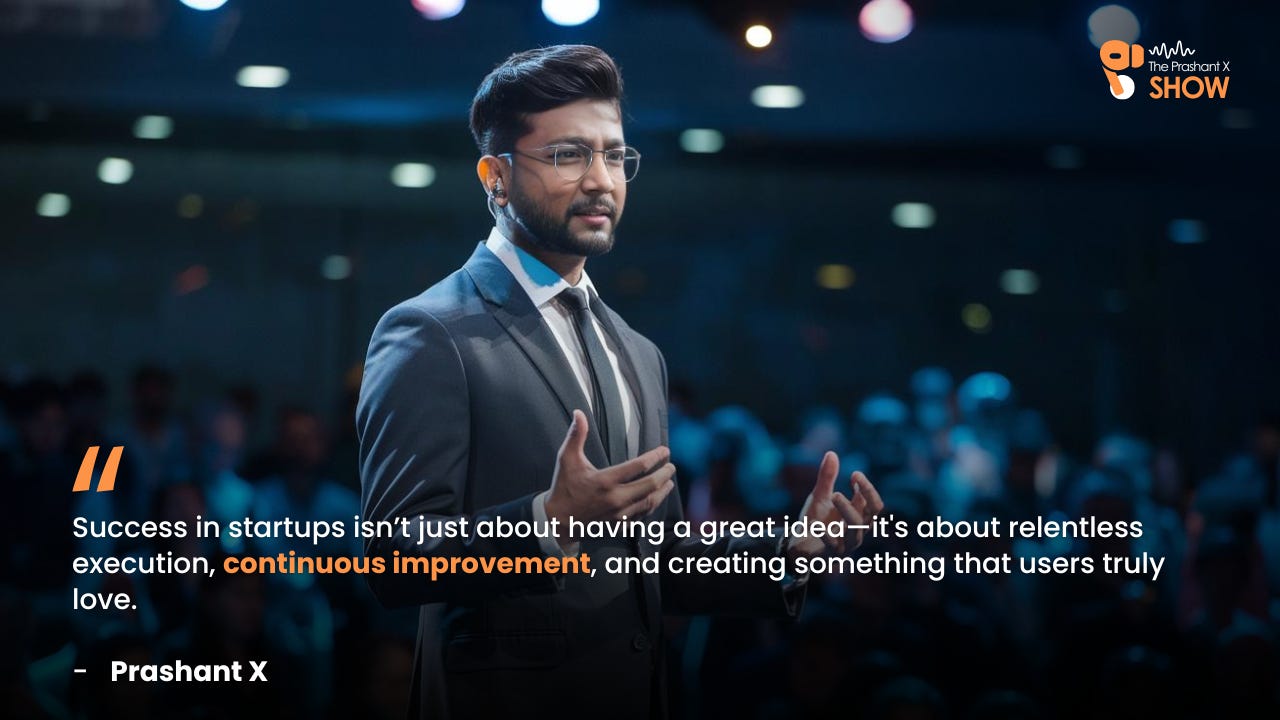Lessons from Sam Altman's Startup Playbook
Discover the secrets to building successful startups from the mind behind OpenAI's legendary founder.
Starting a company is both exhilarating and terrifying. The promise of innovation, the potential for financial success, and the sheer thrill of building something from scratch can be immensely rewarding.
But let’s face it—starting a startup is incredibly hard.
The road is often rocky, with unexpected twists and turns, and the demands can feel overwhelming.
Yet, for those who are up for the challenge, the journey can be one of the most fulfilling experiences of their lives.
Sam Altman’s Startup Playbook distills years of wisdom from guiding startups through Y Combinator, one of the world’s most prestigious startup accelerators.
This guide offers practical advice for every stage of your startup journey, from ideation to execution, and beyond.
Whether you’re new to the startup world or already navigating the turbulent waters, the lessons in this playbook can provide invaluable insights.
Introduction: The Startup Reality Check
Let’s begin with a reality check. Startups are not easy. In fact, they’re much harder than most people imagine.
One of the consistent pieces of feedback from Y Combinator founders is just how intense and all-consuming the startup life can be.
Many founders underestimate the level of work and dedication required. While the allure of creating the next big thing is strong, it’s crucial to understand what you’re signing up for.
Altman starts by emphasizing the fundamental goal of any startup: make something users love. This simple but powerful idea forms the backbone of any successful company.
If you can create a product that users truly love, you’ve laid the groundwork for success. This love drives word-of-mouth growth, fuels user retention, and ultimately, sets the stage for scaling your business.
But here’s the catch—if your users don’t love your product, your startup is doomed to fail. The startup graveyard is filled with companies that built products users merely liked or didn’t care about at all.
The distinction between like and love might seem small, but it’s the difference between a company that thrives and one that fades into obscurity.
Part I: The Idea - The Birthplace of Your Startup
Every startup begins with an idea. But not just any idea—a great idea. The challenge, however, lies in identifying what makes an idea great.
Altman advises that a great idea is clear, concise, and resonates deeply with a specific audience.
It’s not about coming up with a complex, convoluted concept. Instead, the best ideas are often simple and easy to explain. Complexity is usually a sign of muddled thinking or a made-up problem.
To gauge the quality of your idea, ask yourself a few critical questions: Who desperately needs this product?
Why do they need it?
Does it solve a real problem? Ideally, you should be your target user, or at the very least, have a deep understanding of the target audience. If your idea excites people the first time they hear it, you’re on the right track.
However, it’s not enough to have a great idea—you need to test it. The playbook suggests two primary methods for testing an idea: launching and gathering feedback or pre-selling through a letter of intent.
Launching is more suitable for consumer products, where users need to experience the product firsthand to cut through the noise.
For enterprise products, getting a letter of intent from potential customers before building the product can validate your idea and reduce risk.

An essential part of this process is letting your idea evolve. As you receive feedback from users, be prepared to adapt and refine your concept.
Startups are dynamic, and the best founders are those who can pivot based on user input while staying true to their core vision.
Another critical aspect of the idea phase is understanding the market. The size of the market, its growth potential, and why it’s poised to expand are all factors to consider. Altman favors startups that target large parts of small but rapidly growing markets.
Major technological shifts, especially those that large companies haven’t fully realized yet, present golden opportunities for startups.
It’s also worth noting that the best ideas often seem bad at first glance but are actually good.
Don’t be afraid of pursuing something that others dismiss as foolish or impractical. If you’re passionate about it, chances are there’s something there.
And remember, secrecy isn’t as crucial as execution. The real challenge lies in turning an idea into a successful company, not in hiding the idea from others.
The Role of Passion in Ideation
Passion is a key ingredient in the ideation phase. If you’re not deeply passionate about your idea, it’s unlikely you’ll muster the energy and perseverance needed to see it through.
Startups are grueling, long-term endeavors, and without a strong personal connection to your idea, the odds of burning out are high.
Altman makes a strong case for idea-driven startups rather than startup-driven ideas. In other words, it’s better to stumble upon a startup idea naturally—through your interests, experiences, or problems you’ve encountered—than to force yourself to come up with one simply because you want to start a company.
The former leads to more authentic, deeply resonant ideas, while the latter often results in derivative, uninspired concepts that lack staying power.
Testing Your Idea: Real-World Validation
Once you’ve settled on an idea that excites you, the next step is to validate it in the real world. This means getting out of the building, talking to potential customers, and testing your assumptions. Launching a minimum viable product (MVP) is a common strategy for this.
The MVP should be the simplest version of your product that still delivers value to users. It allows you to gather feedback, learn what works, and identify areas for improvement without investing too much time or money upfront.
Another approach, particularly useful for enterprise startups, is to secure a letter of intent from potential customers.
This shows that there’s real demand for your product, even before you’ve built it. It’s a strong validation of your idea and can help you refine your product roadmap.
Part II: Building a Great Team - The Foundation of Your Startup
No matter how brilliant your idea is, it’s nothing without a team to bring it to life. As Altman puts it, “Mediocre teams do not build great companies.” The strength of your team is one of the most critical factors in determining your startup’s success.
So, what makes a great team? It starts with the founders. The best founders are unstoppable—they possess a unique combination of determination, resourcefulness, intelligence, and passion.
They’re the kind of people who will get the job done, no matter the obstacles. Altman notes that great founders often have seemingly contradictory traits, such as being both rigid and flexible.
They’re firm in their mission but open to learning and adapting in other areas.
One of the most important decisions you’ll make as a founder is choosing your co-founder. This decision shouldn’t be taken lightly.
Altman advises against selecting someone you’ve just met. Instead, choose someone you know well, trust, and with whom you share a strong personal connection. A good co-founder relationship can carry you through the toughest times, while a bad one can be disastrous.
The ideal scenario is to have a strong co-founder who complements your skills and shares your vision. If that’s not possible, it’s better to be a solo founder than to bring on a bad co-founder.
And if things aren’t working out with your co-founder, it’s better to part ways quickly rather than dragging out a toxic relationship.
When it comes to hiring, the playbook emphasizes quality over quantity. The best startups are often those that wait a long time before hiring employees. Employees add complexity, communication overhead, and inertia to a startup.
They’re also expensive, both in terms of salary and equity. As a result, it’s crucial to hire only when absolutely necessary and to hire the best people you can find.
The Hiring Process: What to Look For
Hiring the right people is one of the most challenging and critical aspects of building a startup. Altman’s advice is clear: don’t compromise on quality.
The best people have many opportunities and want to join rocketships—startups that are obviously winning. If you have nothing, it will be hard to attract top talent.
But once you start gaining traction, the best people will want to join you.
When evaluating candidates, prioritize aptitude over experience. Look for smart, effective individuals who have a track record of getting things done.
Raw intelligence and adaptability are more important than specific skills or expertise, especially in the early stages. Additionally, ensure that candidates are a good cultural fit.
You’ll be spending a lot of time with these people, often in high-pressure situations, so it’s essential to like and trust them.
One of the best ways to evaluate a candidate is through auditions rather than traditional interviews. Have candidates work on a real project with you before making a hiring decision.
This gives you a much better sense of their capabilities and how they fit into your team. It also allows the candidate to get a feel for your company culture and working style.
Continue reading at : Lessons from Sam Altman's Startup Playbook - Prashant X
Did you find this post helpful? Share your thoughts in the comments below!
Want to stay updated on the latest topics? Be sure to follow us and subscribe to our newsletter for more exciting content. Prashant X
If you'd like a copy of the Startup Playbook, follow me on LinkedIn and send me a DM with the word "PLAYBOOK." I'll send it to you!






